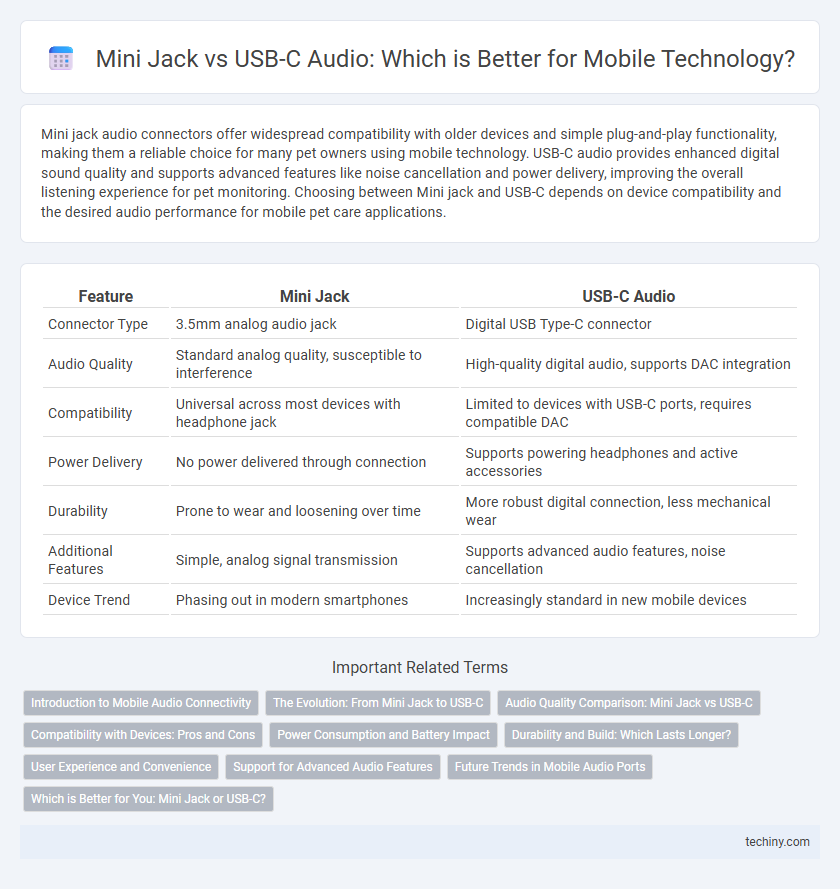Mini jack audio connectors offer widespread compatibility with older devices and simple plug-and-play functionality, making them a reliable choice for many pet owners using mobile technology. USB-C audio provides enhanced digital sound quality and supports advanced features like noise cancellation and power delivery, improving the overall listening experience for pet monitoring. Choosing between Mini jack and USB-C depends on device compatibility and the desired audio performance for mobile pet care applications.
Table of Comparison
| Feature | Mini Jack | USB-C Audio |
|---|---|---|
| Connector Type | 3.5mm analog audio jack | Digital USB Type-C connector |
| Audio Quality | Standard analog quality, susceptible to interference | High-quality digital audio, supports DAC integration |
| Compatibility | Universal across most devices with headphone jack | Limited to devices with USB-C ports, requires compatible DAC |
| Power Delivery | No power delivered through connection | Supports powering headphones and active accessories |
| Durability | Prone to wear and loosening over time | More robust digital connection, less mechanical wear |
| Additional Features | Simple, analog signal transmission | Supports advanced audio features, noise cancellation |
| Device Trend | Phasing out in modern smartphones | Increasingly standard in new mobile devices |
Introduction to Mobile Audio Connectivity
Mobile audio connectivity has evolved with the transition from the traditional 3.5mm mini jack to the newer USB-C audio interface, enhancing device compatibility and audio quality. The 3.5mm mini jack offers universal analog audio support, widely used in smartphones, headphones, and portable speakers. USB-C audio supports digital signal transmission, enabling higher resolution sound and integrated functionalities like charging and data transfer within a single port.
The Evolution: From Mini Jack to USB-C
The evolution from mini jack to USB-C audio reflects a major shift in mobile technology, emphasizing enhanced digital audio quality and device versatility. USB-C offers integrated data transfer and charging capabilities alongside audio output, reducing the need for multiple ports on smartphones and tablets. This transition supports high-resolution audio formats and enables active noise cancellation features that mini jacks cannot natively provide.
Audio Quality Comparison: Mini Jack vs USB-C
Mini jack audio connections provide consistent analog sound quality with minimal latency, favored for traditional audio devices due to their simplicity and broad compatibility. USB-C audio can support higher-resolution digital audio signals and enable features such as noise cancellation and enhanced surround sound through digital processing. However, audio quality via USB-C heavily depends on the device's digital-to-analog converter (DAC), while mini jack's analog output delivers uniformly reliable audio without codec variations.
Compatibility with Devices: Pros and Cons
Mini jack audio connectors offer broad compatibility with a wide range of devices, including older smartphones, laptops, and audio equipment, making them ideal for universal use without adapters. USB-C audio, while providing digital sound quality and additional features like active noise cancellation, often requires specific device support and may lack backward compatibility with traditional headphones. Users with multiple device types may prefer mini jack for seamless interoperability, whereas USB-C suits newer devices prioritizing enhanced audio capabilities and data integration.
Power Consumption and Battery Impact
USB-C audio typically consumes more power than traditional mini jack connections due to active digital-to-analog conversion and amplifier components integrated within USB-C headphones or adapters. This increased power draw can lead to a noticeable reduction in smartphone battery life, especially during extended audio playback. Conversely, mini jack connections use passive analog transmission, resulting in minimal power usage and less impact on device battery capacity.
Durability and Build: Which Lasts Longer?
Mini jack connectors, typically made of metal with reinforced plastic housing, are known for their robust durability and resistance to frequent plugging and unplugging, often lasting several years without significant wear. USB-C audio ports, while versatile and supporting higher data transfer rates, have a more complex internal structure that can be prone to damage if not handled carefully, with durability depending on the quality of the connector and device design. In most cases, mini jack connectors tend to last longer due to their simpler, sturdier build and widespread use in traditional audio devices.
User Experience and Convenience
Mini jack offers universal compatibility with a wide range of existing headphones and audio devices, enhancing user convenience without the need for adapters. USB-C audio provides digital sound quality with potential for advanced features like noise cancellation and amplified audio, improving the overall listening experience. Choosing between mini jack and USB-C depends on user priorities for seamless connectivity versus high-fidelity audio performance.
Support for Advanced Audio Features
USB-C audio supports advanced features like digital signal processing, high-resolution audio output, and active noise cancellation, enabling superior sound quality and enhanced user experience. Mini jack connections are limited to analog signals, restricting support for advanced audio enhancements and multi-channel sound. Modern smartphones increasingly prefer USB-C for its ability to deliver richer, more immersive audio functionalities.
Future Trends in Mobile Audio Ports
The shift from mini jack to USB-C audio ports reflects the mobile industry's push toward digital audio transmission and universal compatibility, enabling higher sound quality and enhanced power efficiency. Future trends indicate a growing adoption of USB-C, supported by expanding wireless audio solutions and the decline of analog interfaces in flagship mobile devices. Continued innovation in USB-C audio, including improved DAC integration and faster data transfer rates, positions it as the dominant standard in mobile audio connectivity moving forward.
Which is Better for You: Mini Jack or USB-C?
Mini jack offers universal compatibility with most audio devices and retains analog audio quality without the need for adapters, making it ideal for users with traditional headphones or audio equipment. USB-C supports digital audio transmission with improved sound quality and advanced features like active noise cancellation but requires compatible headphones or adapters. Your choice depends on whether you prioritize broad compatibility and simplicity (mini jack) or enhanced audio features and future-proofing (USB-C).
Mini jack vs USB-C audio Infographic

 techiny.com
techiny.com